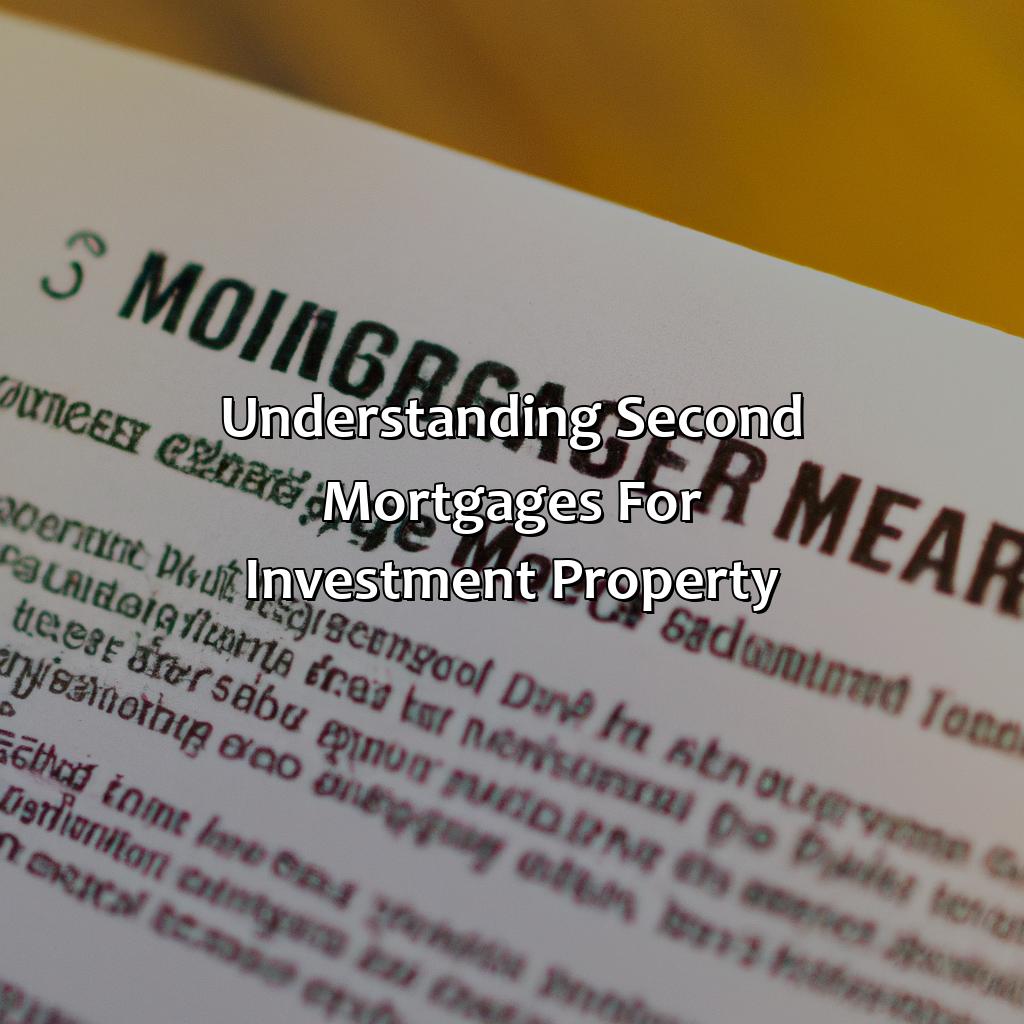How To Get Second Mortgage For Investment Property?
Key Takeaways:
- Second mortgages are a great way to finance an investment property: Second mortgages provide an additional source of funding for investors looking to purchase an investment property. This means that you can take advantage of more opportunities in the market without having to use all of your own funds.
- Consider the risks and rewards of a second mortgage: While a second mortgage can provide many benefits to an investor, it also comes with some risks. It’s important to weigh these carefully and make sure that you are comfortable with the potential downside before proceeding.
- Take the time to research and compare lenders: When looking for a second mortgage, it’s important to shop around and find a lender that offers competitive rates and terms. This will help you find the best possible deal and ensure that you’re getting the most for your money.
Are you an investor who is looking for ways to make the most of your real estate investments? A second mortgage may be the key to unlocking your profit potential. In this article, you’ll discover the process for obtaining a second mortgage for your investment property.
Understanding Second Mortgages for Investment Property
To get a better idea of second mortgages for investment property, check out the definition, types, advantages, and risks. This will assist in making a wise choice when deciding on a second mortgage. The following sections provide a comprehensive guide –
- Definition
- Types
- Advantages
- Risks

Image credits: retiregenz.com by Yuval Woodhock
Definition of Second Mortgage
A second mortgage, or a subordinate lien, is a type of loan that allows property owners to borrow against the equity they have built in their homes. This loan is secured by the same collateral as the primary mortgage. The lender takes a second priority position on the property, meaning that if the borrower defaults and the property is sold or refinanced, the proceeds go first to pay off the primary mortgage. The remaining amount is used to pay off the second mortgage.
For investment properties, getting a second mortgage can improve cash flow for investors who want to purchase more properties without tapping into their savings. It can also be used to access equity in one property for improvements on another. However, obtaining a second mortgage for investment property may involve higher interest rates and stricter approval requirements than those for primary residences.
When considering a second mortgage for investment property, investors should weigh the potential benefits against added costs and risks. They should also ensure they meet all lender requirements regarding credit score, debt-to-income ratio, and other factors that determine eligibility. Working with an experienced lender or financial advisor can help investors make informed decisions when leveraging this option for real estate investing.
Get ready to choose your second mortgage like you’re picking your favorite flavor of ice cream – except this time, the flavors are fixed rate, adjustable rate, and home equity lines of credit.
Types of Second Mortgages
Second Mortgage Options for Investment Properties
Types of Second Mortgages:
- Home Equity Line of Credit (HELOC) – A revolving line of credit accessible for a set period, often with interest-only payments.
- Fixed-Rate Second Mortgage – An installment loan that is paid back in equal monthly payments, with a fixed interest rate and a set term or duration.
- Piggyback Loan – A second mortgage given simultaneously with the primary mortgage, used to avoid PMI. Usually, has a higher interest rate.
In addition to these options, there are specialized second mortgage loans available for investment properties, such as non-conforming loans and portfolio loans. These have different requirements and interest rates from traditional home equity options.
A real estate investor named David faced problems when he tried to secure a second mortgage for his rental property. After researching various options, he applied for a piggyback loan and was approved due to his solid credit score and property value. The additional financing helped him purchase another investment property later on.
Adding a second mortgage is like having a backup plan for your investment property, but be warned – too many backups can lead to a power outage.
Advantages and Risks of Second Mortgages
Second Mortgages-Weighing the Pros and Cons
Second mortgages may seem appealing due to their accessibility but are not without risk. Taking out a second mortgage on your investment property is an important decision that requires careful consideration.
Advantages:
- Provides access to cash: Second mortgages allow homeowners to utilize equity already built in their homes for multiple purposes, including investment with minimal eligibility restrictions.
- Lower interest rates: Second mortgages generally have lower fixed or variable interest rates which make it easier for homeowners to borrow large sums of money.
- Tax advantages: Homeowners can benefit from tax deductions by deducting their interests paid on second mortgages through their tax returns at the end of the year.
Risks:
- Increases Debt: Second mortgaging increases debt as it leads homeowners to take on huge debts besides primary ones. Whether lending money from banks or other financial institutions, borrowers are obliged to pay back these loans within a specified period.
- Foreclosure Risk: A primary mortgage typically has first lien position if you default which implies that the lender gets priority over any other creditors- foreclosure risks increase when you have more than one mortgage, because if there’s another loan behind it,
- Limits Equity and ability to Sell: As more obligations add up, homeowners limit equity growth while someone who had taken out an initial loan is left with much less or no value if they sell the home.
It’s always worth considering all of the factors involved before deciding whether taking out a second mortgage on your investment property is worth it. You need to check your capability of paying the monthly repayments alongside ensuring that there aren’t any hidden charges.
Don’t miss out on potential benefits or put yourself at further risk. If you’re unsure about second mortgages, seek guidance from trusted financial professionals who can help navigate such complex issues.
“Applying for a second mortgage is like trying to balance a bowling ball on your nose – it’s a risky and challenging feat, but with careful consideration of the factors, it can be done.”
Factors to Consider When Applying for Second Mortgage
When applying for a second mortgage for investment property, think about the following:
- loan-to-value ratio (LTV)
- debt-to-income ratio (DTI)
- credit score
- property value
- equity
Gaining knowledge of these topics can help you manage and get the most out of your investments. Taking all these into account will aid in making wise decisions and getting the financing you need for your investment property.

Image credits: retiregenz.com by Joel Washington
Loan to Value Ratio (LTV)
The proportion of the loan to the value of a property is known as Capitalization Ratio (CR). It indicates how much equity you have in your house compared to the amount you owe on your mortgage. Having a higher CR can increase your chances of getting approved for a second mortgage.
Below is a table showing examples of different Loan to Value Ratios (LTV) and their corresponding Capitalization Ratios:
| LTV Ratio | Equity | CR |
|---|---|---|
| 80% | 20% | 1:4 |
| 75% | 25% | 1:3 |
| 70% | 30% | 1:2 |
| 60% | 40% | 2:3 |
Additionally, lenders require that borrowers have sufficient equity from the first mortgage. This means that there should be enough room between the current appraised value of your home and the outstanding balance on your first mortgage.
A colleague I know had a couple of rental properties with second mortgages on them. He managed to get an excellent LTV ratio of around 60%, which allowed him to use his investment properties as collateral for other investments, providing him with more opportunities to scale his business.
Your DTI may need some TLC before applying for a second mortgage – because having more debt than income is like playing Jenga with your finances.
Debt-to-Income Ratio (DTI)
Your ability to secure a second mortgage for investment property depends on your Debt-to-Income ratio (DTI). DTI shows the lender your current debt balances compared to your total income. A low DTI signifies that you can manage additional debt and are more likely to get approved for a loan.
In addition to DTI, it’s important to consider other factors such as credit score, property type, and loan-to-value ratio when applying for a second mortgage. A good credit score shows the lender that you have a history of paying back loans on time, while the type of property and loan-to-value ratio indicate the level of risk involved in lending to you.
When applying for a second mortgage, ensure that you have all necessary documentation ready, including proof of income and assets. Provide an explanation letter if needed to clarify any discrepancies or gaps.
Don’t miss out on investment opportunities due to not understanding the importance of your Debt-to-Income ratio. Consider all factors when applying for a second mortgage for investment property and be sure to present yourself in the best possible light to lenders.
Your credit score may be the key to getting a second mortgage, but it won’t make your ex suddenly want to pay their half of the first one.
Credit Score
Assessing Your Financial History for a Second Mortgage
When obtaining a second mortgage, lenders evaluate more than creditworthiness. While credit score is important and should be above 620, they will review your financial history as well. They will assess your total debt versus income to ensure you are able to pay back the loan.
It’s important to note that each lender has unique requirements. Some may accept a lower credit score while others require a higher one. Ensure you understand their policies before applying.
In lieu of just analyzing numbers, it’s helpful to depict an example of what many lenders consider during the application process.
Equity is like a good wine – it gets better with age, but it’s also better to have more of it when applying for a second mortgage.
Property Value and Equity
When considering a second mortgage for an investment property, it is important to assess the current value and equity of the property. The property’s worth and the amount owed on the existing first mortgage will determine the available equity to borrow against.
Additionally, many lenders require a specific amount of equity to be present before approving a second mortgage. Therefore, it is crucial to ensure that there is enough equity in the property before applying for a second mortgage.
Furthermore, increasing the value of the investment property by making improvements can also boost its equity and improve chances of getting approved for a second mortgage. Adopting cost-effective renovation plans like updating appliances or repainting can lend substantial gains towards your home’s resale value.
Get ready for some serious paperwork and financial scrutiny, because getting a second mortgage is like going through a financial colonoscopy.
Steps to Get Second Mortgage for Investment Property
To get a 2nd mortgage for an investment property, be careful to follow a few steps.
- Research and compare lenders
- Application and documentation are needed.
- The appraisal and underwriting process ensure the investment’s credibility.
- Finally, closing and disbursement of funds finish it up!

Image credits: retiregenz.com by Adam Jones
Research and Comparison of Lenders
When researching for second mortgage lenders, it’s essential to compare terms, interest rates and fees offered to make the best choice. Here is a comprehensive comparison table of top lenders:
| Lender | Interest Rate | Loan Amount | Fees |
|---|---|---|---|
| ABC Mortgage | 4% | $50,000-$500,000 | Origination fees: 1% |
| XYZ Bank | 3.5% | Up to $750,000 | Closing Fees: $2,500 |
It is crucial to note that some lenders may have additional requirements such as credit score and income verification.
Before finalizing the decision on a lender, consider several factors that may affect your borrowing experience. Look beyond interest rates by comparing various loan options and assessing long-term benefits.
Don’t miss out on this golden opportunity to invest in your property. Research and compare multiple lenders before obtaining a second mortgage for investment purposes. Choose the right lender today!
Get ready to show your financial history like a potential employee on steroids.
Application and Documentation
When it comes to obtaining a second mortgage for investment property, there are various application and documentation requirements that need to be met. Mortgage lenders require extensive paperwork including income statements, tax returns, and credit score reports. It is essential to have all the necessary documents ready before submitting the application.
The lender requires information on the investment property such as the purchase price, the current market value, and an appraisal report. The borrower must provide evidence of enough funds to cover monthly payments, closing costs, fees and other associated expenses related to purchasing the property.
In addition to meeting eligibility criteria such as stable employment history and financial stability, having a good debt-to-income ratio could increase approval chances. However, each mortgage lender has specific requirements; therefore, it is beneficial to compare multiple lenders before making a decision.
Skipping any required documentation or failing to provide accurate information may delay loan approval or even result in denial. Make sure all documentation is provided in full as requested by lenders.
By getting all your paperwork ready and contacting multiple mortgage lending providers for prequalification guidelines will save you stress in finding suitable second mortgages for your investment property.
Getting approved for a second mortgage is like trying to impress your in-laws, you have to go through an intense appraisal and underwriting process.
Appraisal and Underwriting Process
The evaluation and loan approval procedure are necessary steps when obtaining a second mortgage for investment property. Through extensive underwriting, lenders determine the borrower’s creditworthiness based on various factors such as income, debt-to-income ratio, and credit score. Property assessment is also crucial where appraisers inspect the property to confirm its actual value.
After retrieving all relevant information from applicants, lenders will then evaluate the borrower’s income documentation, employment status and annual income to assess their capacity to pay back loans. Once examinations have been completed, an appraisal report shall be received from an assigned surveyor who will provide an estimated valuation of the investment property’s current market value.
It is important to know that some lenders may apply different appraisals and standards during this process so it would be best for borrowers looking for investment income properties to research beforehand. It can also speed up processing by providing complete documentation in a timely manner and following through with any necessary requirements or corrections as requested by the lender.
Anyone seeking financing should weigh the cost-benefit of borrowing from home equity versus paying any tax implications along with expected rental yield returns. Henceforth, retaining an experienced mortgage professional can help individuals gain additional insight into this subject matter.
When it comes to closing and disbursement of funds, remember: money talks, but lawyers insist on speaking for it.
Closing and Disbursement of Funds
The final step in obtaining a second mortgage for investment property involves the “Closing and Release of Funds.” To put it simply, this is the time when all parties involved sign the necessary documents and transfer funds. The lender may disburse the funds directly to you or send them to an escrow account.
During the Closing and Disbursement of Funds, several fees may be incurred, including appraisal fees, attorney fees, and loan origination fees. These costs are typically rolled into your total loan amount but can also be paid upfront.
It’s worth noting that some lenders might require additional documentation or additional steps before releasing funds. Be sure to keep communication open with your lender throughout the process to avoid any delays.
Experts at Bankrate suggest that borrowers spend an average of $1,058 on closing costs for a mortgage of $200,000.
Source: https://www.bankrate.com/mortgages/average-closing-costs/
Five Facts About How To Get Second Mortgage For Investment Property:
- ✅ A second mortgage for investment property is a loan taken out against a property that is already mortgaged. (Source: Investopedia)
- ✅ Lenders typically require a higher credit score and a larger down payment for a second mortgage on an investment property. (Source: The Balance)
- ✅ The interest rate on a second mortgage for an investment property is typically higher than on a primary residence. (Source: Rocket Mortgage)
- ✅ The amount of money that can be borrowed through a second mortgage on an investment property depends on the equity in the property and the lender’s policies. (Source: HomeLight)
- ✅ Some lenders offer portfolio loans, which are a type of second mortgage for investors who own multiple properties. (Source: Forbes)
FAQs about How To Get Second Mortgage For Investment Property?
What is a second mortgage for investment property?
A second mortgage for investment property is a type of loan that allows you to use the equity in your property to take out a second mortgage. This money can be used for further investment purposes, such as buying an additional property or making renovations to your existing property.
How do I qualify for a second mortgage for investment property?
To qualify for a second mortgage for investment property, you will need to have a good credit score and at least 20% equity in your property. You may also need to provide proof of income and have a solid investment plan in place.
What are the benefits of a second mortgage for investment property?
One of the main benefits of a second mortgage for investment property is that it allows you to access additional funds for further investment opportunities. Additionally, the interest on your second mortgage may be tax-deductible, which can help reduce your overall tax burden.
What are the risks of a second mortgage for investment property?
One of the main risks of a second mortgage for investment property is that it increases your debt load and can make it more difficult to manage your finances. Additionally, if the value of your property drops, you may end up owing more on your mortgage than your property is worth.
How much can I borrow with a second mortgage for investment property?
The amount you can borrow with a second mortgage for investment property will depend on a variety of factors, including the equity in your property, your credit score, and your overall financial situation. To get a better idea of how much you can borrow, it’s a good idea to speak with a lender.
What should I consider before getting a second mortgage for investment property?
Before getting a second mortgage for investment property, you should consider your long-term investment goals, your ability to manage additional debt, and the potential risks and rewards of taking out this type of loan. You should also carefully review the terms and conditions of any loan offer before accepting it.
